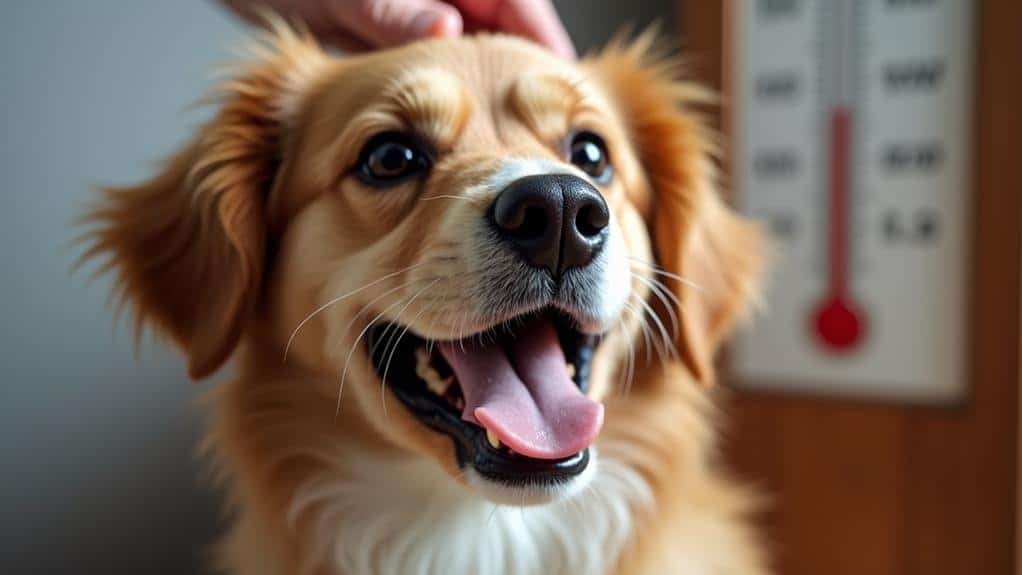Your dog's heavy breathing could be due to several reasons. Normal panting helps dogs cool down, but persistent heavy breathing at rest might signal a problem. Common causes include anxiety, pain, or medical conditions like heart disease or respiratory infections. Brachycephalic breeds, such as Pugs, are prone to breathing issues. Monitor your dog's breathing rate; anything over 40 breaths per minute at rest is concerning. Look for other symptoms like lethargy, coughing, or changes in gum color. While some heavy breathing is normal, especially after exercise or in hot weather, it's best to consult your vet if you're worried. Understanding the underlying causes can help you keep your furry friend healthy and comfortable.
Understanding Normal Dog Breathing Patterns

Your dog's breathing pattern can tell you a lot about their health and well-being. Understanding what's normal for your furry friend is essential to spotting potential issues early on. So, let's explore the basics of healthy dog breathing!
1. Normal Respiratory Rate
For most dogs, a normal breathing rate at rest falls between 15 to 35 breaths per minute. On average, you'll see about 24 breaths per minute.
To check your pup's respiratory rate:
- Watch their chest rise and fall while they're relaxed
- Count the breaths for 30 seconds, then multiply by two
2. When to Be Concerned
If you notice your dog's breathing rate exceeding 40 breaths per minute while resting, it's time to pay attention. This could be a sign of heavy breathing, which might warrant a trip to the vet.
3. Panting vs. Heavy Breathing
Don't confuse normal panting with concerning heavy breathing. Panting is your dog's way of cooling off, especially after exercise or in warm weather.
However, if you spot persistent heavy breathing when your dog should be calm, it's best to consult your vet for a thorough check-up.
Causes of Heavy Breathing
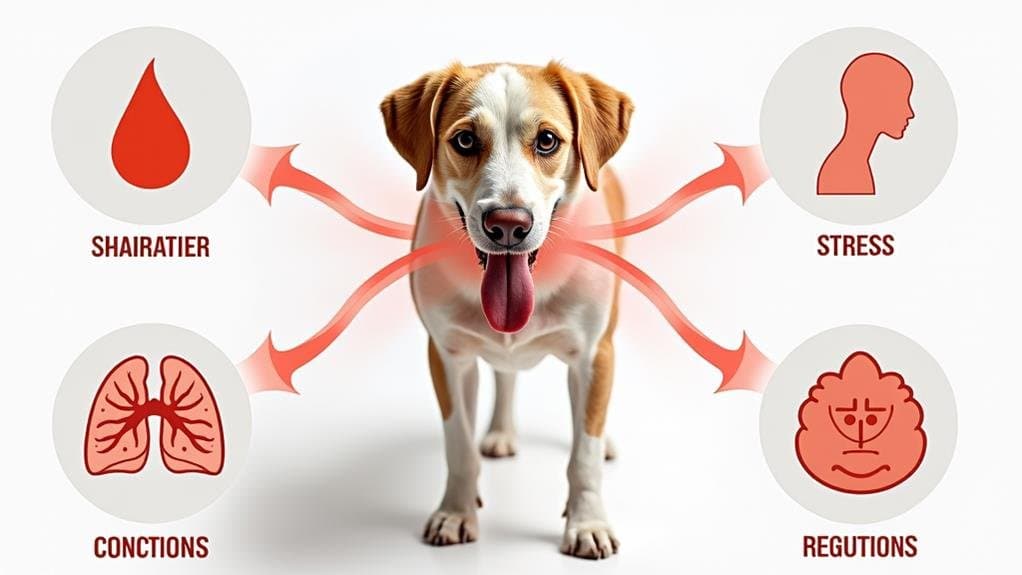
Heavy breathing in dogs can stem from a variety of causes, ranging from normal physiological responses to serious medical conditions. Understanding these causes can help you better care for your furry friend.
1. Temperature Regulation
The most common reason for heavy breathing in dogs is panting to cool down. Since dogs don't sweat like humans, they rely on panting to regulate their body temperature.
2. Breed-Specific Issues
If you own a brachycephalic breed like a Pug or French Bulldog, you'll notice they're prone to heavier breathing due to their short snouts. These breeds often face respiratory issues that can lead to labored breathing.
3. Medical Conditions
Several health problems can cause heavy breathing:
- Heart failure
- Cushing's syndrome
- Respiratory infections
- Obesity
4. Anxiety or Stress
Just like humans, dogs may breathe heavily when they're anxious or stressed. If you notice this behavior in non-stressful situations, it's worth investigating further.
5. Pain
Conditions like pancreatitis can cause pain, leading to heavy breathing as a response.
Recognizing Abnormal Panting

Recognizing abnormal panting in your dog is essential for early detection of potential health issues. When your dog is breathing heavy, it's important to understand what's normal and what's not.
Normal breathing rates for dogs at rest range from 10 to 35 breaths per minute, but anything above 40 is considered abnormal and potentially concerning.
To identify abnormal breathing patterns:
- Monitor your dog's breathing during calm periods to establish a baseline.
- Watch for consistent heavy panting, especially when your dog is resting.
- Look for accompanying symptoms like lethargy, coughing, or changes in gum color.
If you notice your furry friend panting excessively, it could be a sign of underlying health issues such as respiratory problems or cardiovascular problems.
Don't panic, though! Sometimes, your pup might just be a little overheated or excited. However, if the heavy breathing persists, it's time for a veterinary consultation.
Heavy Breathing in Puppies

While adult dogs have their own breathing patterns, puppies present unique respiratory characteristics that pet owners should understand. Your puppy's normal respiratory rate typically falls between 15-40 breaths per minute, but don't be alarmed if you notice heavy breathing in puppies during sleep. This is often due to dreaming and is accompanied by adorable whimpers and leg twitches.
However, it's essential to keep a watchful eye on your furry friend's breathing patterns. Puppies are more susceptible to respiratory infections and other health issues, so monitoring their breath is key to catching potential problems early.
Here's what to look out for:
- Persistent heavy breathing while resting
- Excessive panting without apparent cause
- Signs of distress, such as lethargy or loss of appetite
If you notice any of these abnormal breathing patterns, don't hesitate to schedule a veterinary evaluation. Your vet can help rule out underlying health problems and guarantee your puppy's respiratory system is functioning properly.
When to Seek Veterinary Care
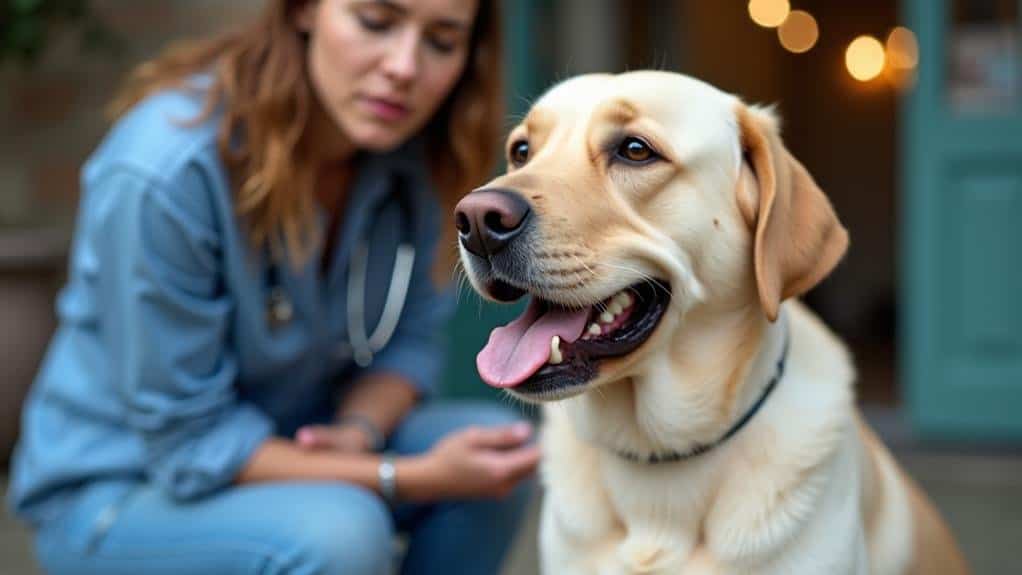
As a responsible pet owner, knowing when to seek veterinary care for your dog's heavy breathing can make a significant difference in their health and well-being.
It's essential to pay attention to your furry friend's respiratory patterns, especially when they're at rest.
When to Seek Immediate Veterinary Care:
- Heavy breathing at rest
- Symptoms like coughing, lethargy, or changes in gum color
- Signs of distress, such as excessive drooling or blue-tinged gums
- Reluctance to lie down
These signs could indicate serious health issues, including heart failure or respiratory diseases.
Don't wait to see if things improve on their own – your quick action could save your pup's life!
When to Schedule a Veterinary Appointment:
- Persistent heavy breathing after exercise or excitement
- Increased respiratory rates above 40 breaths per minute while resting
- Any sudden changes in breathing patterns
Diagnosing Heavy Breathing Issues
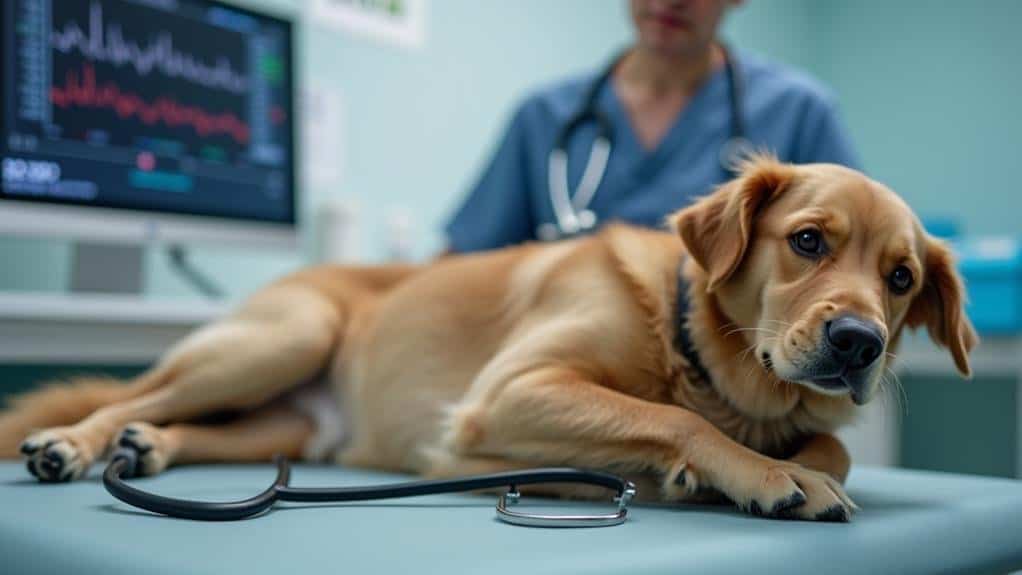
A detective's keen eye is needed when diagnosing your dog's heavy breathing issues. Your veterinarian will play the role of Sherlock Holmes, carefully examining your furry friend to uncover the underlying conditions causing distress.
The process begins with a thorough physical examination, where your vet will listen intently to your dog's heart and lungs, searching for clues.
If your dog is breathing heavily, your veterinarian might recommend a series of diagnostic tests to get to the bottom of the issue:
- X-rays to check for lung or heart abnormalities
- Blood tests to rule out infections or other health concerns
- Ultrasounds for a closer look at internal organs
In some cases, your pup might need supplemental oxygen during the examination to help them breathe easier.
Your vet may also suggest more advanced tests like echocardiography or bronchoscopy for a deeper exploration into your dog's respiratory health.
Treatment Options for Respiratory Distress
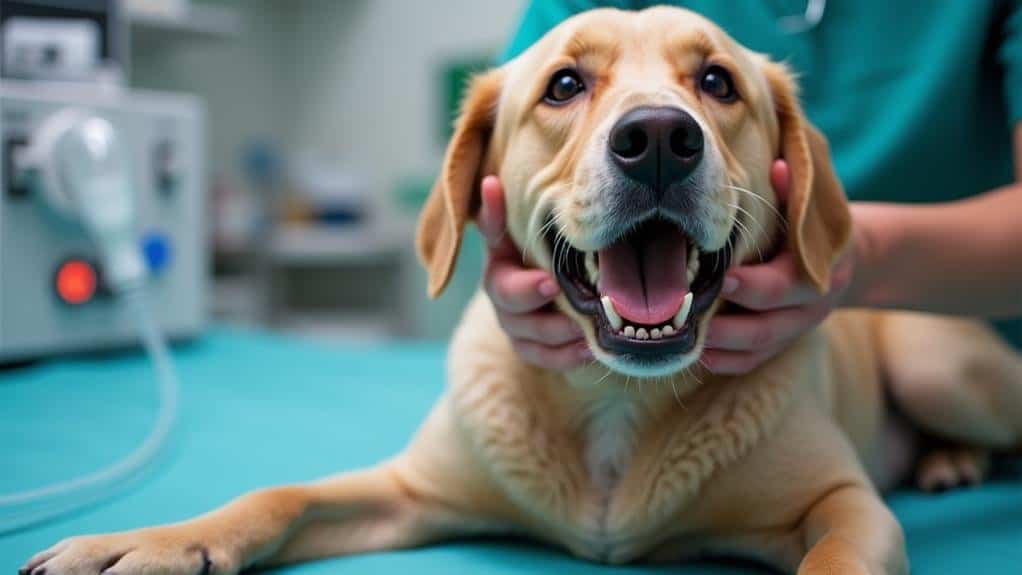
Treatment game plans for respiratory distress in dogs are as diverse as the causes behind them. Your vet will tailor the approach based on your furry friend's specific needs, focusing on addressing the underlying cause while providing relief.
Treatment Options:
1. Medications: Your pup might be prescribed corticosteroids to reduce inflammation or bronchodilators to open up those airways. These can work wonders in helping your dog breathe easier.
2. Oxygen Therapy: If your pooch is really struggling, they might need a bit of extra air support. Oxygen therapy can be a real lifesaver for dogs with severe respiratory distress.
3. Fluid Drainage: In some cases, fluid buildup in the chest can make breathing tough. A procedure called thoracocentesis might be necessary to drain that pesky fluid and give your dog's lungs more room to expand.
4. Supportive Care: Don't underestimate the power of TLC! Proper hydration and rest are vital for recovery.
You'll need to keep a close eye on your dog's breathing patterns and report any changes to your vet.
5. Follow-ups: Regular check-ins with your vet are key to making sure the treatment's working its magic. They'll adjust the plan as needed to keep your pup on the road to recovery.
Preventing Breathing Problems in Dogs
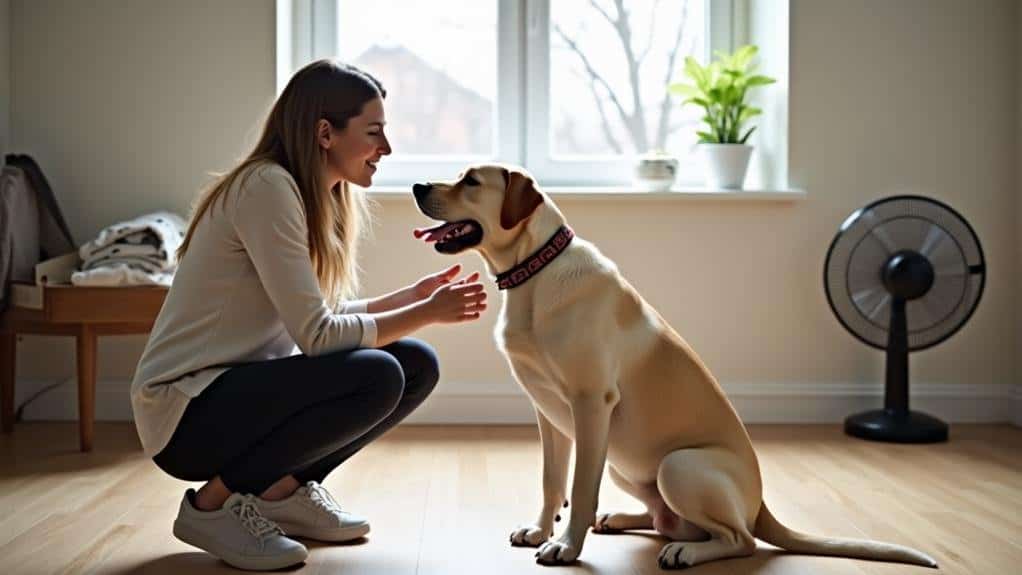
When it comes to preventing breathing problems in dogs, proactive care is key. As a responsible pet owner, you'll want to focus on several aspects of your furry friend's lifestyle to guarantee they maintain healthy respiratory function.
1. Exercise and Weight Management
Regular exercise isn't just about keeping your pup fit—it's vital for maintaining a healthy weight. By keeping your dog at an ideal weight, you're reducing the strain on their respiratory system. Take your pooch for daily walks or play fetch in the backyard to keep them active and their lungs in top shape.
2. Clean Living Environment
You mightn't realize it, but your dog's living space can greatly impact their breathing. Keep their area clean and free from allergens and irritants that could trigger respiratory issues. This means regular vacuuming, dusting, and washing their bedding to minimize potential breathing hazards.
3. Weather Considerations
When the mercury rises, your dog's breathing can become labored. Prevent heat-related heavy breathing by providing plenty of shade and fresh water during hot weather. Your pup will thank you for keeping them cool and comfortable!
4. Regular Veterinary Check-ups
Don't underestimate the importance of routine vet visits. These check-ups allow for early detection of potential respiratory issues, guaranteeing timely interventions if needed. Plus, your vet can provide valuable advice on managing your dog's overall health.
Frequently Asked Questions
Why Is My Dog Breathing Heavy While Resting?
Your dog's heavy breathing while resting could indicate underlying health issues. Common causes include respiratory conditions, heart problems, or anxiety. Monitor for additional symptoms and consult your vet if breathing rate exceeds 40 breaths per minute.
When Should I Be Concerned About My Dog Breathing?
You should be concerned if your dog's breathing is rapid (over 40 breaths per minute) at rest, accompanied by lethargy or coughing, or if they're showing signs of distress. Any persistent heavy breathing while resting warrants veterinary attention.
How Do I Calm My Dog's Breathing?
To calm your dog's breathing, create a quiet environment, speak soothingly, and pet them gently. Practice deep breathing yourself, as dogs often mimic their owners. Offer water and guarantee they're comfortable. If issues persist, consult your vet for guidance.
What Can I Give My Dog for Heavy Breathing?
You shouldn't give your dog anything for heavy breathing without consulting a vet first. They'll diagnose the cause and may prescribe medication. Meanwhile, make certain your dog has fresh water and a calm environment to rest in.
Conclusion
Your dog's heavy breathing can be caused by various factors, from normal exertion to serious health issues. By understanding your pup's usual breathing patterns and recognizing signs of distress, you'll be better equipped to care for them. Remember, if you're ever in doubt about your furry friend's respiratory health, don't hesitate to consult your vet. With proper attention and care, you can help guarantee your dog breathes easy and stays happy and healthy for years to come.

